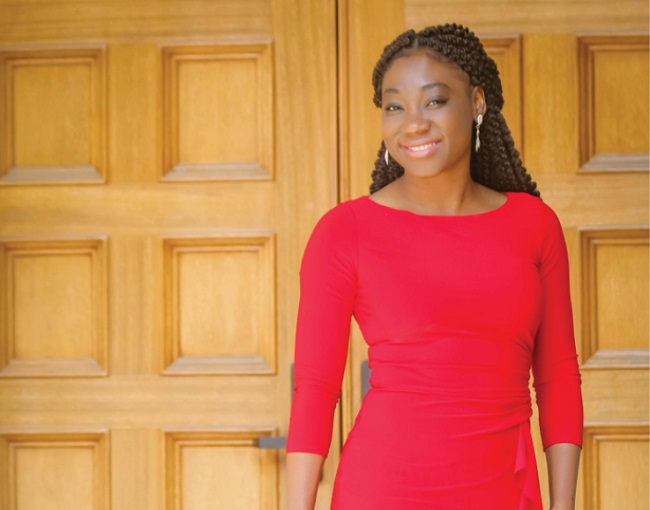Thirty-two-year-old Ayomidamope Adebiyi moved to the United States at the age of 19 to further her education and is passionate about health care equity and access, especially for African women and children. As founder of a non profit, donation funded organisation called ‘Care for the unreached’, she provides lifesaving health education and community health outreach programs quarterly in rural communities in Nigeria that have no access to healthcare by using existing Primary Health centres as an entry point. In this interview by YEJIDE GBENGA-OGUNDARE, she speaks on life as a family nurse, running an organisation in two countries and women making a difference among other issues.
As a nurse, how do you run a free outreach organisation in two different countries?
I am actually a family nurse practitioner who specialises in occupational and environmental health, which means that while I am passionate about family medicine, I am equally passionate about employees’ health at the workplace and the overall workplace safety. I run care for the unreached in Nigeria thankfully mostly to the access of the internet and telephone it’s made the project more seamless to work with people on the ground to have a continued impacts in the rural communities and I’m also involved in global health and health mission work here in the United States because realistically there are also needs here in some communities in the United States. For instance, maternal mortality in black women are three times higher than white women, also there are a lot of migrants, most farming communities that don’t have easy access to health care.
I see myself as a global citizen, and I am always aware that I live in a global village. If many don’t even know that before, I believe the COVID-19 pandemic has shown the light of how blurred geographical borders have become and the need for us as health care advocates to be involved and aware of things happening in other parts of the world as well. How I manage all my engagements can be and is sometimes challenging and overwhelming, but I think when you’re passionate about something you always have the opportunity and the room to get it done. It doesn’t mean it’s not going to be challenging but you just find a way, even if it is to wake up at night to meet the deadlines. I have to also emphasise that the project in Nigeria, even though I’m a focal point it’s primarily being run by a host of partners and volunteers on the ground and the various primary health centers who open their doors for us to come. We have conducted over six health care outcomes and also provided prenatal and antenatal health teachings to over 300 new mothers. they also received free newborn care package and the attendance to our outreach also increases an access to childhood vaccinations. So far over 100 children have been able to get vaccination that will protect them against preventable diseases.
You seem particular about maternal mortality and morbidity. What is this?
I’m particular about maternal, newborn and child mortality I think basically because I’m a woman and also because statistics don’t lie. The chance of a woman in Nigeria dying from childbirth, pregnancy or necessitated abortion is one in 22 whereas in the developed country where I live, the chance is one in 4900; that is a huge contrast and there are many factors that lead to these negative outcomes. One is the overall health care institutions and then the lack of access to basic primary health care in many rural communities in Nigeria, where incidences of high maternal and child mortality are mostly evident. Secondly, there is also lack of life saving health education that provides information on the importance of pre-natal care, assisted delivery with trained midwives and community health workers who can identify possible birth complication and escalate it to state hospitals that might have the necessary skill set and facilities to protect the life of the mother and child. Also, on the issue of neonatal and child mortality, according to the WHO, one in five Nigerian children never makes it to age five. Some of these are preventable deaths, such as malnutrition, lack of access to life saving vaccinations, preterm delivery without access to thermoregulations. The UN 2030 SDG 3 goals is to reduce neo-natal and under- five mortality by one third, and for Nigeria to achieve this goal, we definitely cannot leave it to the government alone to tackle. That is what ‘Care for the Unreached’ is trying to do. We set our mission to look for how our local interventions and initiative can led into national and global gains in addressing this issues.
You started out as a communication student, how did you get into nursing?
Before and after I left Nigeria, how do I give back and contribute was one of the lingering questions and agenda in my heart I’m very passionate about Nigeria even though sometimes I get super frustrated about the state of the country as well.
I’ve always wanted to do something that could touch people’s lives but I never thought about medicine or healthcare because even the way classes were being taught make sciences very difficult to understand. But, when I got to the United States, I saw that while going into nursing will be challenging because I never had that core-biological science background, the environment was conducive enough for me to take that dive knowing that there would be resources and the opportunity to learn, some via tutoring to get me to what I wanted to become so I knew I was going to be passionate, and I have an automatic goal to serve so it was an opportunity I was willing to take.
What influenced your decision?
I believe my personal life actually influenced my decision to become a nurse I was born prematurely at 29 weeks as one of triplets two boys and myself, my mom went into labor and delivered, three babies who were all alive but over the course of weeks, which mainly was due to lack of appropriate and available health care for those tiny, preterm babies; she lost the two boys days apart and I survived only based on sheer luck. When I left Nigeria, it actually gave me a time and space to be reflective and think about that incident a lot more and also realise that while my mom suffered a big loss of two babies, she was still thankful for the doctor, and the matron nurse at the Special Care Baby Unit at UCH that were just so comforting, kind and provided the best kind of care that they could in the situation despite her loss.So when I moved to the US, every time I listen to the news, there are countless stories of maybe 20 week old premature babies who weigh even as little or less than two pounds that had incubators and the needed treatments to survive. Whereas, in Nigeriathe outcome would have been similar to my mother’s experience of loss, this made me to see the gap I could fill, and also be like the Doctor (Rasheed Gbadegesin) and the matron nurse at UCH SCBU in 1989 to some other mother and child. I just saw that America was the landing ground for me to get an education as a nurse leader and caregiver. My career in healthcare was theonly way that I could address the same issues that led to the deaths of my two brothers so basically I always felt like I really didn’t choose nursing but my life was orchestrated to this profession and now only been a nurse is how to pay it forward in a positive way into the cause that was similar to mine.
What are your thoughts on women trying to make a difference?
I think supporting women makes a difference, we need to pull to make a difference we have to create an enabling environment where there is access to good education in acknowledgement for their effort. It actually translates positively to the growth of that country or nation but I don’t only want women to make a difference, I want women to be able to own themselves. I would also like to say we’ve been making a difference because every local community, every local economic space that you go to is occupied by women, women have been making a difference but the society has just not given women chance to take full ownership of themselves and that is the next way to go
What would you say is the problem facing women in Nigeria?
There are many problems facing women in Nigeria. Some of the challenges are the issue of physical and sexual violence, lack of equal pay for work that their male counterparts are doing which inadvertently leads to economic inequality. There are women who still need their husband’s consent to even open bank accounts and some of them don’t even own a bank account of their own. There is also the exclusion of women in political participation. Lack and access to basic education is a big issue because not having an education definitely widens the economic gap between genders. So the move to ending discrimination against women is not only a human rights issue but it is actually critical to the sustainability of the country






